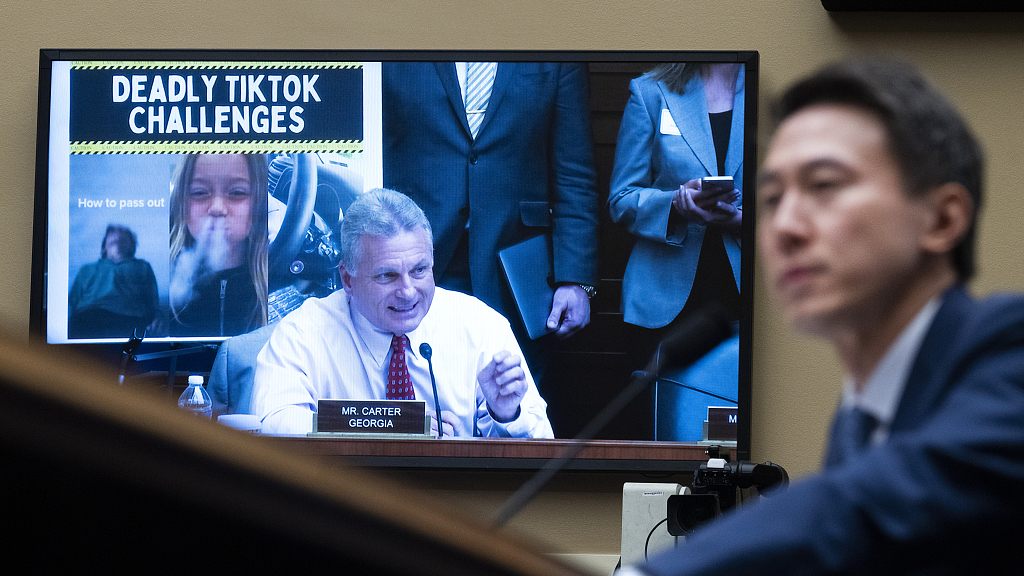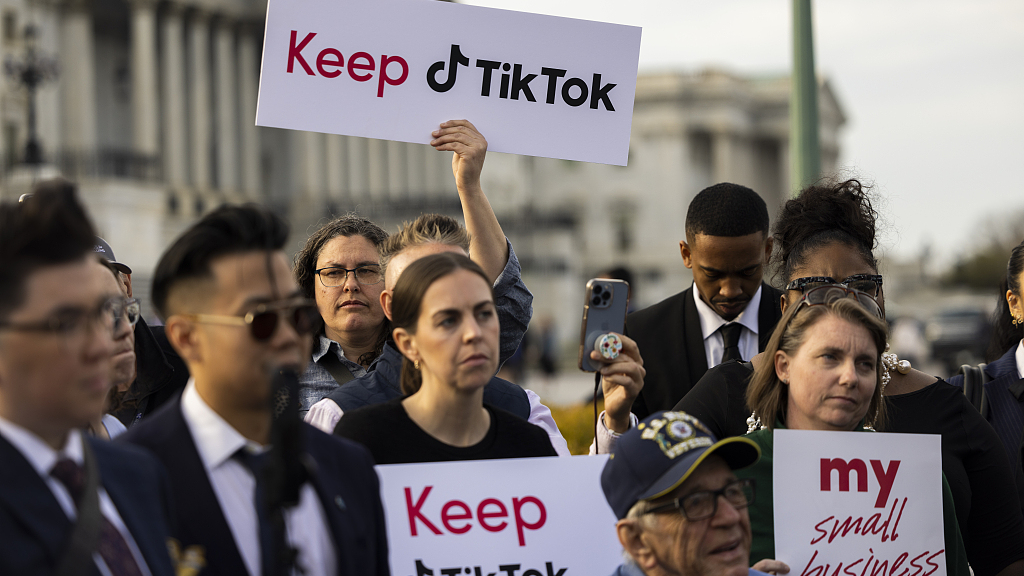
U.S. Republican Georgia Representative Earl L. "Buddy" Carter questions TikTok CEO Shou Zi Chew during the House Energy and Commerce Committee hearing titled "TikTok: How Congress Can Safeguard American Data Privacy And Protect Children From Online Harms," in Rayburn Building, Washington, D.C., March 23, 2023. /CFP
U.S. Republican Georgia Representative Earl L. "Buddy" Carter questions TikTok CEO Shou Zi Chew during the House Energy and Commerce Committee hearing titled "TikTok: How Congress Can Safeguard American Data Privacy And Protect Children From Online Harms," in Rayburn Building, Washington, D.C., March 23, 2023. /CFP
TikTok CEO Shou Zi Chew testified before a congressional committee on Thursday as the popular social media platform faces a potential forced sale or ban in the United States, representing a critical moment that is not only a fight for TikTok's survival but also another fierce contest between two of the world's great powers: China and the U.S.
U.S. lawmakers badgered Chew about potential Chinese influence over the platform and claimed that short videos on it were damaging to the mental health of children, during a House hearing entitled "TikTok: How Congress Can Safeguard American Data Privacy and Protect Children from Online Harms."
On the potential Chinese influence over the platform, Chew said at the hearing that although ByteDance, the parent company of TikTok, was founded by a Chinese entrepreneur, it has grown into a multinational company.
Chew repeatedly denied that the app shares data or has connections with the Communist Party of China, adding that TikTok remains a platform for free expression that cannot be manipulated by any government and allows for third-party independent oversight.
Chew argued that the platform was doing everything in its power to ensure safety for its 150 million American users who "love our app."
According to CNN, independent researchers have backed Chew's assertions: In 2020, The Washington Post worked with a privacy researcher to study the app and concluded that it does not appear to collect any more data than the typical mainstream social network. The following year, Pellaeon Lin, a Taiwan-based researcher at the University of Toronto's Citizen Lab, performed another technical analysis that reached similar conclusions.

TikTok content creators gather outside the U.S. Capitol to voice their opposition to a potential ban on the app, highlighting the platform's impact on their livelihoods and communities in Washington, D.C., United States, March 22, 2023. /CFP
TikTok content creators gather outside the U.S. Capitol to voice their opposition to a potential ban on the app, highlighting the platform's impact on their livelihoods and communities in Washington, D.C., United States, March 22, 2023. /CFP
Content creators, U.S. reps decry TikTok crackdown
Meanwhile, the U.S. government's single-minded crackdown on TikTok does not appear to represent the app's 150 million U.S. users.
A group of U.S. internet celebrities reportedly told Congress ahead of the hearing that banning the app would provoke widespread opposition.
"It is one of the most powerful tools that young people have to engage each other and to get civically involved," said Aidan Kohn-Murphy, an American content creator and activist with around 300,000 TikTok followers, the Wall Street Journal reported on Wednesday.
American politics isn't monolithic about cracking down on TikTok, either.
U.S. Representatives Jamaal Bowman, Mark Pocan, and Robert Garciaon on Wednesday said they opposed any potential ban on the app. Jamaal said the drive to ban TikTok stems from anti-China "hysteria," reported The New York Times.
Legal questions over TikTok ban
Reuters cited experts saying that it would be difficult for the U.S. to completely ban TikTok without a firm legal basis.
One expert said any move to block the app likely depends on the passage of legislation like the RESTRICT Act, a bipartisan bill introduced by U.S. senators this month that would give the Commerce Department new powers to ban foreign technology that poses a national security risk.
U.S. courts previously blocked the Trump administration from banning TikTok on grounds that it violated free speech protections. Experts say passage of the restrictions bill would further empower the U.S. government to circumvent speech protections in current law, according to Reuters.
China says it opposes forced sale of TikTok
TikTok's crackdown in the U.S. has drawn the attention of the Chinese government, with the Ministry of Commerce saying on Friday that it opposes any possible U.S. plan to force TikTok's Chinese owners to sell the short-video platform over security concerns.
A forced sale would seriously damage investors from multiple countries including China, and hurt confidence in investing in the U.S., said ministry spokesperson Shu Jueting.
Shu added that the potential sale or spin-off of TikTok involves technology export and must go through administrative licensing procedures in accordance with Chinese laws and regulations.
'Suppression of Chinese companies detrimental'
Meanwhile, some are linking the recent crackdown on TikTok to the U.S. government's previous actions against tech giant Huawei on the grounds of "national security," saying it also lacks any evidence.
Xiang Ligang, president of the Information Consumption Alliance, told Global Times that the U.S. government does not have a complete "blueprint" for industrial suppression, and to a large extent, the current actions are just a posturing for the election and a political show to attract voters.
Xiang said that such suppression of Chinese companies completely violates international rules, undermines the order of industrial supply chains, harms the interests of China and the U.S., and is detrimental to the global economy.